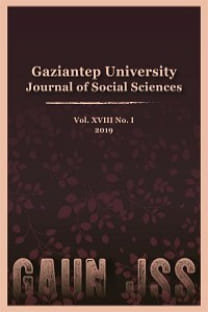The Sense of Belonging in Kipling's Kim
Hindistan'ın sömürülmesindeki ana rolü üstlenen ülke Büyük Britanya'dır. Bu sömürgecilik süreci her iki ülke arasında yüzyıllar süren karşılıklı bir iletişim sağlar. Fakat her iki ülke arasında kültürel, geleneksel ve yaşam tarzı olarak büyük farklılıklar bulunmaktadır. İki toplum arasındaki sosyal ve kültürel etkileşim sonucu ortaya çıkan veriler, yazarlar için önemli bir kaynak olagelmiştir. RudyardKipling sömürgecilik sürecini hem çocukluğunda hem de olgunluk çağında yaşamış bir yazardır. Kipling, Kim adlı yapıtını bu deneyimlerin sonucu olarak kaleme alır. Bu çalışma, yapıtın ana karakteri olan Kim'in aidiyet duygusunu ele almaktadır. Kim'in kişilik sorunu ile ilgili çok çalışma yapılmasına karşın onun en büyük sorunu aidiyet duygusu çıkmazıdır. Aslında bu yapıt Kim'in aidiyet duygusu sorunu etrafında yapılandırılmıştır. Küçük yaşta ebeveynlerini kaybetmesi, aile otoritesinden uzak köksüz bir birey olarak büyümesine neden olur. Bu nedenle aidiyet duygusu zayıf bir karakter ortaya çıkar.
Kipling'in Kim Romanında Aidiyet Duygusu
India had been exploited by the western world for centuries before it gained its ultimate independence in the twentieth century. The Great Britain has the major role in the colonization of India. The BritishEmpire has treasured India as an important colony. There are profound differences in cultures, traditions and life styles of English and Indian nations. This massive diversity can be observed in all levels of life. The colonisation has led to an interaction between two countries for centuries. The social and cultural interaction has generated plentiful data for writers not only during colonization but also after colonization. Rudyard Kipling has experienced the colonial process both as a child and an adult. The story of Kim has been written as a result of these experiences. This study focuses on the main character Kim's sense of belonging. Nowadays, the problem of sense of belonging becomes an important issue as the world becomes globalized.
___
- Brantlinger, P. (1997). "A Post-industrial Prelude to Post colonialism: John Ruskin, William Morris, and Gandhism", Critical Inquiry, Vol. 22, No. 3, The University of Chicago Press. pp. 466-485,
- Hai, A. (1997)."On Truth and Lie in a Colonial Sense: Kipling's Tales of Tale- Telling". ELH, Vol. 64, No. 2, The Johns Hopkins University Press, pp. 599- 625.
- Hubel, T. (2004)."In Search of the British Indian in British India: White Orphans, Kipling's Kim, and Class in Colonial India", Modern Asian Studies 38, 1, Cambridge University Press. pp. 227-251.
- Kipling, R. (2008). Kim, Oxford University Press.
- Mason, P. (1973)."Delusions and Discoveries about the British in India", Pacific Affairs, Vol. 46, No. 3, University of British Columbia, pp. 430-434.
- Meyers, J. (1984). "Kipling and Hemingway: The Lesson of the Master", American Literature,Duke University Press, Vol. 56, No. 1, pp. 88-99.
- Sarath-Roy A. R. (1914). "Rudyard Kipling Seen through Hindu Eyes", The North American Review, Vol. 199, No. 699, University of Northern Iowa, pp. 271-281.
- Wegner, P. E. (1994). "Life as He Would Have It": The Invention of India in Kipling's Kim. Cultural Critique, No. 26, University of Minnesota Press, pp. 129-159.
- Woodcock, G. (1973)."A Distant and A Deadly Shore: Notes on the Literature of the Sahibs", Pacific Affairs, Vol. 46, No. 1, University of British Columbia, pp. 94-110.
- ISSN: 1303-0094
- Yayın Aralığı: Yılda 4 Sayı
- Başlangıç: 1991
- Yayıncı: Gaziantep Üniv. Sosyal Bilimler Enst.
Sayıdaki Diğer Makaleler
Kipling’in Kim Romanında Aidiyet Duygusu
Müze Temelli Yaratıcı Yazma Etkinliği: Bir Durum Çalışması
Türkiye’de Savunma Harcamaları, Büyüme ve Gelir Eşitsizliği, 1970-2008: Ekonometrik Bir İnceleme
Seyhan TAŞ, İbrahim ÖRNEK, Gül AKSOĞAN
Âşık Ömer’in Koşmalarında Söz Varlığı
İsmet Kırdar'ın Hacı Bektaş Velî Romanı Üzerine
İlköğretim ve Ortaöğretim Okullarında Sosyal Etkinlik ve Yönetimi
The Sense of Belonging in Kipling's Kim
